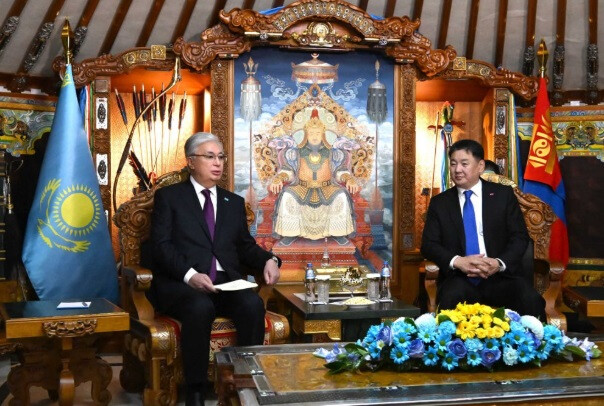
Astana/Ulaanbaatar – In a significant move to boost economic cooperation, Kazakh President Kassym-Jomart Tokayev visited Mongolia in late October 2024, holding talks with his Mongolian counterpart, Ukhnaagiin Khurelsukh. Tokayev emphasized the need to enhance cooperation in key economic sectors, particularly mining. Both leaders agreed on the necessity of flagship projects to significantly contribute to the development of economic cooperation. Kazakhstan has since become Mongolia's first strategic partner in Central Asia.
Tokayev's visit to Mongolia followed a meeting at the SCO Summit in Astana where both leaders agreed to establish a Kazakhstan-Mongolian business council and adopt a roadmap to strengthen trade and economic cooperation. Historically, trade turnover between Kazakhstan and Mongolia has been modest, not exceeding $200 million, but Kazakhstan's exports significantly outweighing Mongolia's imports indicates potential for growth. This is the first state visit by a Kazakh leader to Mongolia since 2008, and it was only after Tokayev's visit that a business council between the two countries was established.
Key factors driving the state visit include Mongolia's accession to the Eurasian Economic Union's Free Trade Area (FTA EAEU) and the development of alternative transportation routes for Mongolia, particularly considering the interest of European Union countries in Mongolia's mineral resources. During the visit, Tokayev emphasized that Kazakhstan and Mongolia cooperate closely at the international and regional levels and share similar positions on many issues. He stated that Kazakhstan supports Mongolia's intention to conclude a free trade agreement with the EAEU.
Since 2022, Tokayev has visited almost all countries with which the EAEU has free trade agreements, including Iran, Singapore, and Vietnam. In 2021, a visit to Serbia, an EAEU FTA member, was also planned. In 2023, Tokayev stated that the EAEU should expand free trade zones with other countries.
Mongolia is actively pursuing the conclusion of an interim free trade agreement with the Eurasian Economic Union, aiming to complete negotiations by the end of 2024. The country plans to reduce or eliminate import duties on certain categories of goods, lowering import costs and increasing the competitiveness of products on the domestic market. The focus is particularly on increasing exports of livestock products and obtaining duty-free access to the EAEU markets.
In the field of economic cooperation, Mongolia aims to develop bilateral trade by eliminating trade barriers and improving market access. It plans to strengthen the competitiveness of the national industry through cooperation in investment and the development of domestic production capacities and industrial enterprises. Since the initial cooperation agreement between Mongolia and the EAEU was signed in 2015, there has been progress in implementing the agreement. In 2020, a joint study group was established to explore the possibility of concluding a free trade agreement, and in May 2024, negotiations on an interim trade agreement officially began following the highest Eurasian Economic Council meeting. Currently, the two sides have already agreed on the future framework of the trade agreement, indicating significant progress in negotiations.
In the areas of trade and investment, joint projects are planned in the processing of raw materials and the development of logistics infrastructure. This progress has a significant impact on relations with Kazakhstan. Kazakhstan and Mongolia currently plan to increase bilateral trade from $150 million to $500 million annually. Kazakhstan supports Mongolia's aspirations to conclude a free trade agreement with the EAEU and has facilitated the establishment of the Mongolia-Kazakhstan business council. A roadmap for strengthening trade and economic cooperation in 2025-2027 has been adopted, which includes cooperation in the agricultural, industrial, and energy sectors.
Strengthening trade relations with the EAEU is expected to boost Mongolia's economy by 6.5% over the next few years, with Mongolia's trade turnover with Russia and other EAEU countries increasing by almost 25%. The elimination or reduction of import duties on certain goods will make trade cheaper and stimulate economic integration. Mongolia's transition from observer status to an active trade partner in the EAEU is a significant step towards strengthening regional economic ties. The conclusion of an interim free trade agreement opens up new opportunities for the development of key sectors of the Mongolian economy, such as infrastructure, energy, agriculture, and industry.
[Copyright (c) Global Economic Times. All Rights Reserved.]






























